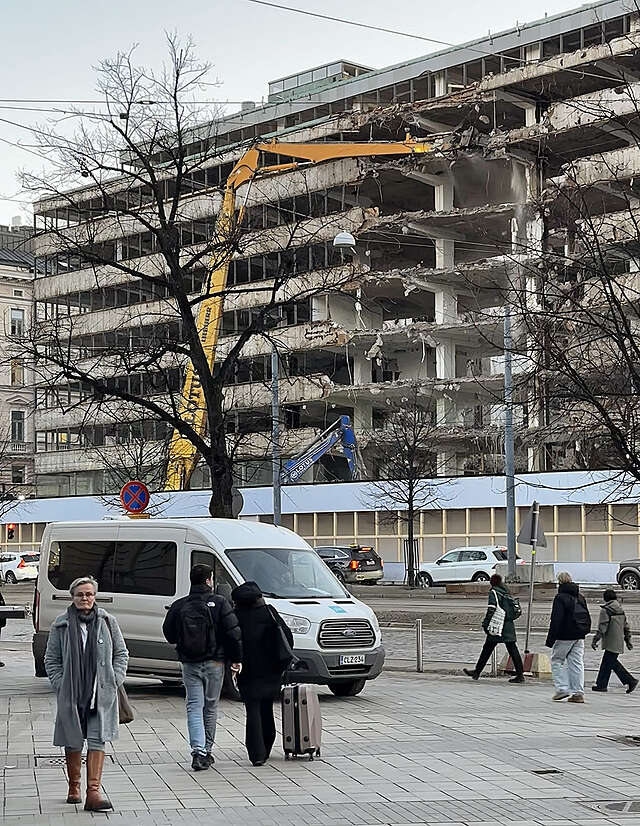The Finnish government wants to make demolition easier – will this endanger our built heritage?

Miina Jutila
Finland is currently experiencing a wave of demolition on a scale comparable to the destruction of cityscapes in the 1960s. The Finnish Association of Architects (Safa) is taking a stand against the government's proposed changes to the law, which it says go against the principles of a democratic society and international agreements.
According to Safa, the amendments to the Building Act proposed by Prime Minister Petteri Orpo's government would make demolishing buildings easier than before and place unacceptable restrictions on the right to appeal against building and demolition permits.
Under the government's so-called "repair package", the demolition of a building is merely conditional on the town plan and the building not being protected by law. What the proposed amendment deletes is the condition that the demolition permit must be granted only if it doesn’t prevent the achievement of the objectives of protecting the built environment.
According to Asko Takala, President of Safa, this condition is very important.
"The preservation of Finland's architectural heritage is being jeopardised," says Mr Takala, pointing out that Finland is a signatory to several international conventions, which the proposal violates.
According to a statement by the Finnish Association of Architects on the amendment proposal, the relaxation of the demolition permit decisions for listed buildings and the significant weakening of expert assessment in decision-making threatens the preservation of valuable Finnish architectural heritage.
Repair and maintenance support climate objectives, not demolition
The Land Use and Building Act, which entered into force in 2000, has been under a long period of reform since 2018. A year ago, the Finnish Parliament adopted a new Building Act, which is due to enter into force at the beginning of 2025. Prime Minister Orpo’s government is now proposing changes to this already-approved law.
One of the most essential starting points for the overall law reform has been to mitigate climate change. In its statement on the proposed amendment, Safa says that the changes and facilitations for demolition will lead to more imprudent demolition permit decisions, which will have an effect contrary to the law's aim.
"The proposal does not encourage long-term maintenance of properties in line with sustainable development objectives," says Asko Takala.
The government is also proposing an amendment that would remove the requirement to submit a climate report and material description for detached houses, extensions and renovation projects.
"Renovation and refurbishment account for more than half of all construction, which is why it is imperative that a climate report and material description are also produced for renovation projects. The extension of a building is also new construction, so these reports should also be required for extensions," Takala says.
Citizens' opportunities for influence are narrowing
The old Land Use and Building Act, in force until the end of this year, allows an individual citizen of a municipality to appeal against a building demolition permit. The new Building Act, adopted by Parliament, already narrows the scope of the right to appeal but allows registered associations whose activities include preserving cultural heritage or influencing the quality of the built environment to appeal against building and demolition permits.
To top this, the Orpo government's proposed amendment would remove the right of appeal for these organisations altogether, which would significantly reduce citizens' ability to influence the law. The proposed amendment would also limit the right of appeal of the Centre for Economic Development, Transport and the Environment and museum authorities.
According to Safa, the proposed changes to the conditions of the demolition permit, together with the planned restrictions on the right of appeal, could undermine the integration of the built environment's values into decision-making.
"Safa does not accept the limitation of the right to appeal – the right to appeal is the citizen's constitutional right. The proposed amendment would remove the possibility for local residents to influence their environment, even through a registered association," says Heini Korpelainen, Senior Advisor at Safa.
"According to the Constitution, responsibility for cultural heritage belongs to everyone and public authorities must seek to ensure that everyone has the opportunity to influence decisions concerning their living environment."
In its statement, Safa says that in addition to the Constitution, Finland is also bound by international treaties and regulations, such as the Aarhus Convention of 2004 and the Faro Framework Convention of 2018, which guarantee the public's right to information, participation in decision-making and access to justice in environmental matters. The Finnish government's recently adopted policy, Finland’s Architectural Policy Programme 2022–2035, also emphasises public participation.
In addition, the Faro Convention commits Finland to promote the protection of cultural heritage in its legislation as a key factor in achieving the objectives of sustainable development, cultural diversity and modern creativity.
As the demolition wave continues to roar, wiping out layers of our built heritage, more and more actors in the architecture field are voicing their concerns about the development.


